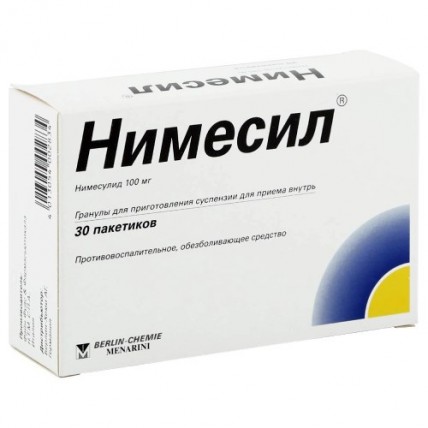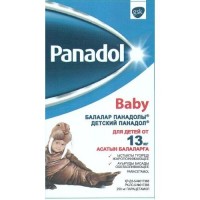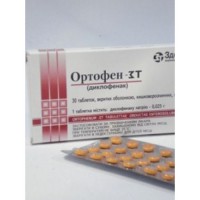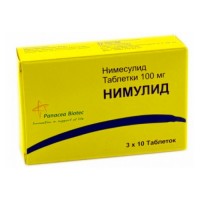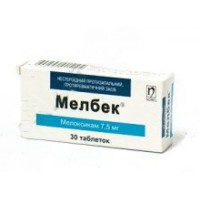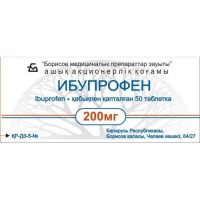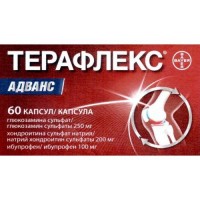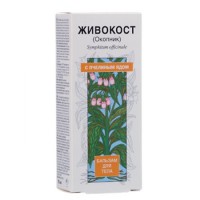Nimesil® granules for oral suspension 100 mg/2 g, 30 sachets
- $32.70
Composition, form of release and packaging
Granules - 1 pack.:
- Active ingredient: nimesulide - 100 mg;
- Excipients: macrogol cetostearyl ether, sucrose, maltodextrin, anhydrous citric acid, orange flavor.
2 g of granules in a three-layer bag
.
Indications for use
- Acute pain (including pain in the back, lower back; pain in the musculoskeletal system, including bruises, sprains and dislocations of the joints; tendinitis, bursitis; toothache);
- symptomatic treatment of osteoarthritis (osteoarthritis) with pain syndrome;
- primary algomenorrhea.
The drug is intended for symptomatic therapy, reducing pain and inflammation at the time of use. Nimesulide should be used as a second line drug. The decision to prescribe nimesulide should be based on a risk assessment for each patient.
Contraindications for use
- Hypersensitivity to nimesulide or other components of the drug;
- hyperergic reactions in history (bronchospasm, rhinitis, urticaria) associated with the use of acetylsalicylic acid (ASA) or other NSAIDs;
- complete or incomplete combination of bronchial asthma, recurrent polyposis of the nose or paranasal sinuses with intolerance to ASA and other NSAIDs (including history);
- hepatotoxic reactions to nimesulide in history;
- simultaneous use with other drugs with potential hepatotoxicity (for example, other NSAIDs);
- chronic inflammatory bowel disease (Crohn's disease, ulcerative colitis) in the acute phase;
- the period after coronary artery bypass grafting;
- fever and/or flu-like symptoms;
- peptic ulcer of the stomach or duodenum in the acute phase; erosive and ulcerative lesions of the gastrointestinal tract in the acute phase; erosive and ulcerative lesions of the gastrointestinal tract in history; history of perforation or gastrointestinal bleeding, including those associated with previous NSAID therapy;
- cerebrovascular bleeding or other active bleeding, or diseases accompanied by increased bleeding;
- severe blood clotting disorders;
- severe heart failure;
- severe renal failure (creatinine clearance <30 ml / min);
- confirmed hyperkalemia;
- liver failure or any active liver disease;
- children's age up to 12 years;
- pregnancy and breastfeeding period;
- alcoholism, drug addiction;
- hereditary fructose intolerance, sucrase-isomaltase deficiency and glucose-galactose malabsorption syndrome.
Arterial hypertension, diabetes mellitus, compensated heart failure, coronary heart disease, cerebrovascular disease, dyslipidemia / hyperlipidemia, peripheral arterial disease, smoking, renal failure (creatinine clearance 30-60 ml / min).
History of Helicobacter pylori infection elderly age; long-term previous use of NSAIDs; severe somatic diseases.
Simultaneous use with the following drugs: anticoagulants (eg, warfarin), antiplatelet agents (eg, ASA, clopidogrel), oral glucocorticosteroids (eg, prednisolone), selective serotonin reuptake inhibitors (eg, citalopram, fluoxetine, paroxetine, sertraline).
Pregnancy and lactation
The use of nimesulide during pregnancy and breastfeeding is contraindicated.
Suppression of prostaglandin synthesis may adversely affect pregnancy and/or embryonic and fetal development. The results of epidemiological studies indicate that drugs that suppress the synthesis of prostaglandins used in the early stages of pregnancy can increase the risk of spontaneous abortion, as well as the development of heart disease in the fetus and non-closure of the anterior abdominal wall; thus, the absolute risk of developing anomalies of the cardiovascular system increased from approximately less than 1% to 1.5%. It is believed that the risk increases with increasing dose and duration of use.
In the third trimester of pregnancy, all inhibitors of prostaglandin synthesis can lead to the development of fetal cardiopulmonary pathology (premature closure of the ductus arteriosus and hypertension in the pulmonary artery system) and impaired renal function, which can progress and lead to renal failure with the development of oligohydramnios. In addition, even when used in low doses, the mother at the end of pregnancy and the newborn may experience an increase in bleeding time associated with antiplatelet action, as well as suppression of uterine contractility, leading to delayed labor or prolonged labor in the mother. There is no information on the penetration of nimesulide into breast milk.
Preparations containing nimesulide, like other NSAIDs, are not recommended for women planning pregnancy (see section "Special Instructions"). In women who have problems conceiving, or who are undergoing examination due to infertility, the possibility of discontinuing the drug Nimesil® should be considered.
Side effects
Side effects identified in controlled clinical trials* (about 7800 patients) and post-marketing studies are listed below in accordance with the WHO classification in descending frequency of occurrence: very often (≥1/10), often (≥1/100, <1/ 10), infrequently (≥1/1000, <1/100), rarely (≥1/10000, <1/1000), very rarely (<1/10000), including individual messages.
Clinical studies and epidemiological data suggest that the use of some NSAIDs, especially at high doses and for a long time, may be accompanied by a slight increase in the risk of developing arterial thrombosis (for example, myocardial infarction or stroke) (see section "Special Instructions").
There are reports of the development of edema, increased blood pressure and the development of heart failure against the background of the use of NSAIDs. In very rare cases, bullous reactions have been reported, including Stevens-Johnson syndrome and toxic epidermal necrolysis. The most frequently observed adverse events from the gastrointestinal tract. Perhaps the development of peptic ulcers, perforation or gastrointestinal bleeding, in some cases life-threatening, especially in elderly patients (see section "Special Instructions"). According to reports, against the background of the use of drugs containing nimesulide, nausea, vomiting, diarrhea, flatulence, constipation, dyspepsia, abdominal pain, melena, hematemesis, ulcerative stomatitis, exacerbation of colitis and Crohn's disease may occur (see section "Special instructions "). Gastritis was less frequently observed.
Blood and lymphatic system disorders
Rare: anemia*, eosinophilia*; Very rare: thrombocytopenia, pancytopenia, thrombocytopenic purpura.
Immune System Disorders
Rare: hypersensitivity reactions*; Very rare: anaphylactoid reactions.
Metabolic and nutritional disorders
Rare: hyperkalemia*.
Mental disorders
Rarely: a feeling of fear *, nervousness *, nightly "nightmares" dreams.
Nervous System Disorders
Infrequently: dizziness *, feeling of stupor; Very rare: headache, drowsiness, encephalopathy (Reye's syndrome).
Violations of the organ of vision
Rare: blurred vision*; Very rare: blurred vision.
Hearing and labyrinth disorders
Very rare: vertigo.
Cardiac disorders Rare: tachycardia*.
Vascular disorders
Uncommon: increased blood pressure*; Rarely: hemorrhages*, lability of blood pressure, flushing of blood to the skin of the face.
Respiratory, thoracic and mediastinal disorders
Uncommon: shortness of breath*; Very rare: asthma, bronchospasm.
Gastrointestinal disorders
Often: diarrhea*, nausea*, vomiting*; Uncommon: constipation*, flatulence*, gastrointestinal bleeding, ulcer and/or perforation of the stomach or duodenum; Very rare: gastritis*, abdominal pain, dyspepsia, stomatitis, tarry stools.
Liver and biliary tract disorders
Often: increased levels of "liver" enzymes *; Very rarely: hepatitis, fulminant (fulminant) hepatitis (including deaths), jaundice, cholestasis.
Skin and subcutaneous tissue disorders
Uncommon: pruritus*, skin rash*, increased sweating; Rare: erythema*, dermatitis*; Very rare: urticaria, angioedema, facial edema, erythema multiforme, Stevens-Johnson syndrome, toxic epidermal necrolysis.
Renal and urinary disorders
Rare: dysuria*, hematuria*; Very rare: urinary retention*, renal failure, oliguria, interstitial nephritis.
General violations
Uncommon: edema*; Rare: malaise*, asthenia*; Very rare: hypothermia.
*The frequency is based on the results of clinical studies.
To monitor the balance of benefits and risks when using the drug, it is necessary to report the occurrence of side effects. If the side effects described above are observed, or they are observed in a more pronounced degree, or if you have noted any other side effects, then please immediately inform your doctor about this. Healthcare professionals should report adverse events through the national pharmacovigilance system.
Interaction with other meds
Pharmacodynamic interaction
Other non-steroidal anti-inflammatory drugs
Simultaneous use of drugs containing nimesulide with other NSAIDs. including ASA (at doses ≥ 1 g per dose or ≥ 3 g per day as an anti-inflammatory agent), not recommended {see section "Special Instructions").
Anticoagulants
NSAIDs may increase the effect of anticoagulants such as warfarin (see section "Special Instructions"). Patients taking warfarin, similar anticoagulants or ASA concomitantly with nimesulide have an increased risk of bleeding, and therefore this combination is not recommended. In patients with severe coagulation disorders, this combination is contraindicated (see section "Contraindications"). If combination therapy still cannot be avoided, careful monitoring of blood coagulation parameters should be carried out.
Antiplatelet agents and selective serotonin reuptake inhibitors (SSRIs) increase the risk of gastrointestinal bleeding (see section "Special Instructions").
Glucocorticosteroids may increase the risk of gastrointestinal ulcers or gastrointestinal bleeding.
Diuretics, angiotensin converting enzyme (ACE) inhibitors, angiotensin II receptor antagonists
NSAIDs can weaken the effect of diuretics and other antihypertensive drugs. In some patients with reduced renal function (for example, dehydrated patients or elderly patients with insufficient renal function), concomitant use of ACE inhibitors and COX inhibitors may further progression of deterioration in kidney function, including the occurrence of acute renal failure, which is usually reversible.
The possibility of such an interaction should be considered in patients taking drugs containing nimesulide together with ACE inhibitors or angiotensin II receptor antagonists.
Therefore, the simultaneous use of these drugs should be carried out with caution, especially in elderly patients. Patients should receive sufficient fluids; the need to monitor renal function after the start of combination therapy and during treatment (periodically) should be considered.
Mifepristone
There is a theoretical risk of changing the effectiveness of mifepristone under the influence of prostaglandin synthetase inhibitors. Limited data suggest that co-administration of mifepristone with NSAIDs on the day of prostaglandin use does not adversely affect the effect of mifepristone or prostaglandin on cervical maturation or uterine contractility and does not reduce the clinical efficacy of medical abortion agents.
Pharmacokinetic interaction: the effect of nimesulide on the pharmacokinetics of other drugs
Furosemide
In healthy volunteers, nimesulide reduced the diuretic effect and caused a reversible decrease in sodium excretion under the action of furosemide and, to a lesser extent, potassium excretion. The simultaneous use of nimesulide and furosemide leads to a decrease (about 20%) in AUC and a decrease in the cumulative excretion of furosemide, without changing the renal clearance of furosemide. The simultaneous use of drugs containing furosemide and nimesulide requires caution in "sensitive" patients with renal or heart failure (see section Special Instructions).
Lithium
There are reports that NSAIDs reduce the clearance of lithium, which leads to an increase in the concentration of lithium in the blood plasma and its toxicity. When using nimesulide in patients on lithium therapy, regular monitoring of the concentration of lithium in the blood plasma should be carried out.
Clinically significant interactions with glibenclamide, theophylline, digoxin, cimetidine and antacids (for example, a combination of aluminum and magnesium hydroxides) were not observed.
Nimesulide inhibits the activity of the CYP2C9 isoenzyme. Plasma concentrations of drugs that are substrates of this enzyme may increase with simultaneous use with nimesulide.
When using nimesulide less than 24 hours before or after the use of methotrexate, caution is required, since in such cases the concentration of methotrexate in the blood plasma and, accordingly, toxic effects may increase.
Due to the effect on renal prostaglandins, prostaglandin synthetase inhibitors, which include nimesulide, may increase the nephrotoxicity of cyclosporins.
Dosage and administration
inside. Dissolve the contents of the sachet in a glass of non-carbonated water (approximately 100 ml), mix with a spoon until a suspension with an orange scent is obtained. The suspension must be consumed immediately after preparation.
Adults and children over 12 years old: 1 sachet (100 mg nimesulide) twice a day, after meals.
Elderly patients: in the treatment of elderly patients, there is no need to adjust the daily dose (see section "Pharmacokinetics").
Use in children
Children aged 12 - 18 years: dose adjustment is not required, taking into account the pharmacokinetic and pharmacodynamic characteristics of nimesulide.
Children under 12 years of age: the use of drugs containing nimesulide is contraindicated.
The maximum daily dose for adults and children over 12 years of age is 200 mg.
The maximum duration of treatment with Nimesil® is 15 days.
Patients with renal insufficiency
In patients with mild to moderate renal insufficiency (creatinine clearance 30-60 ml / min), taking into account pharmacokinetic data, dose adjustment is not required, while in patients with severe renal insufficiency (creatinine clearance <30 ml / min), Nimesil® contraindicated.
Patients with liver failure
The use of Nimesil® in patients with hepatic insufficiency is contraindicated.
Side effects of the drug can be minimized by using the lowest effective dose for the minimum period necessary to relieve symptoms.
Overdose
Symptoms: acute overdose of NSAIDs is usually limited to the following symptoms, usually reversible with maintenance therapy: apathy, drowsiness, nausea, vomiting, pain in the epigastric region. Gastrointestinal bleeding is possible. In rare cases, it is possible to increase blood pressure, develop acute renal failure, respiratory depression and coma. There are reports of the development of anaphylactoid reactions against the background of the use of NSAIDs in therapeutic doses, their occurrence is also possible with an overdose. Treatment: in case of an overdose of NSAIDs, symptomatic and supportive therapy should be organized for patients. There is no specific antidote. There are no data on the possibility of removing nimesulide by hemodialysis, however, given the high degree of binding to plasma proteins (up to 97.5%), it can be assumed that dialysis is ineffective in case of an overdose of the drug. If there are symptoms of an overdose or after taking the drug in large quantities within 4 hours after ingestion, it is necessary to induce vomiting and / or provide activated charcoal (from 60 to 100 g for an adult) and / or an osmotic laxative. Forced diuresis, alkalinization of urine, hemodialysis or hemoperfusion may be ineffective due to the high level of drug binding to blood proteins. It is necessary to monitor the function of the kidneys and liver. If there are symptoms of an overdose or after taking the drug in large quantities within 4 hours after ingestion, it is necessary to induce vomiting and / or provide activated charcoal (from 60 to 100 g for an adult) and / or an osmotic laxative. Forced diuresis, alkalinization of urine, hemodialysis or hemoperfusion may be ineffective due to the high level of drug binding to blood proteins. It is necessary to monitor the function of the kidneys and liver. If there are symptoms of an overdose or after taking the drug in large quantities within 4 hours after ingestion, it is necessary to induce vomiting and / or provide activated charcoal (from 60 to 100 g for an adult) and / or an osmotic laxative. Forced diuresis, alkalinization of urine, hemodialysis or hemoperfusion may be ineffective due to the high level of drug binding to blood proteins. It is necessary to monitor the function of the kidneys and liver.
Precautions and special instructions
Undesirable side effects can be minimized when using the drug at the lowest effective dose with the minimum duration of use necessary to relieve symptoms (see section "Method of administration and doses" and subsections "Effect on the gastrointestinal tract", "Effect on the cardiovascular system" below).
In the absence of positive dynamics, drug treatment should be discontinued.
The simultaneous use of nimesulide with other NSAIDs, including selective COX-2 inhibitors, should be avoided.
During the use of the drug Nimesil®, patients should refrain from taking other analgesics.
The Nimesil® preparation contains sucrose (0.15-0.18 XE per 100 mg of the drug), this should be taken into account in patients with diabetes mellitus. This drug is contraindicated in patients with hereditary problems of fructose intolerance, glucose-galactose malabsorption or sucrase-isomaltase deficiency.
Effect on the liver
There are reports of serious reactions from the liver, including, in very rare cases, fatal, associated with the use of nimesulide (see section "Side Effects").
If patients develop symptoms similar to those of liver damage (eg, anorexia, nausea, vomiting, abdominal pain, fatigue, dark urine) or abnormal liver function tests during the use of Nimesil®, the drug should be discontinued. Repeated use of nimesulide in such patients is contraindicated. There are reports of liver damage, in most cases reversible with short-term use of the drug. If patients develop flu or cold symptoms while using nimesulide, treatment with the drug should be discontinued.
Effect on the gastrointestinal tract
There are reports of occurrence of gastrointestinal bleeding, ulcers or perforations (in some cases life-threatening) against the background of the use of any NSAID at different stages of treatment, both with the onset of symptoms-precursors, and without them, and regardless of the presence of serious history of gastrointestinal complications.
The risk of gastrointestinal bleeding, ulcers or perforation increases with an increase in the dose of NSAIDs, if patients have a history of an ulcer, especially complicated by bleeding or perforation (see section "Contraindications"), as well as in elderly patients. For patients who are simultaneously taking low-dose ASA or other drugs that increase the risk of gastrointestinal disorders, combination therapy with protective drugs, such as proton pump inhibitors, should be considered (see section "Interaction with other drugs").
Patients with a history of gastrointestinal toxicity, especially elderly patients, should report any unusual gastrointestinal symptoms (particularly gastrointestinal bleeding) to the physician, especially in the initial stages of treatment. Gastrointestinal bleeding, ulcer, ulcer perforation can develop at any stage of treatment, both with and without warning symptoms, and regardless of the presence or absence of a history of gastrointestinal pathology. With the development of gastrointestinal bleeding or ulcers against the background of the use of nimesulide, the drug should be discontinued. The use of nimesulide is contraindicated in patients with gastrointestinal diseases, including ulcerative colitis and Crohn's disease (see section "Contraindications").
Patients simultaneously taking drugs that may increase the risk of ulcers or bleeding: oral glucocorticosteroids, anticoagulants (for example, warfarin), selective serotonin reuptake inhibitors or antiplatelet agents (for example, ASA), the drug should be used with caution (see section "Interaction with other medicinal products). If gastrointestinal bleeding or ulcers occur in patients receiving nimesulide, treatment with the drug should be discontinued.
Elderly patients
In elderly patients, the use of NSAIDs may increase the incidence of side effects, especially such as gastrointestinal bleeding and ulcer perforation (in some cases life-threatening), as well as impaired renal, hepatic and cardiac function (see section "Side effect"). In this regard, appropriate monitoring is recommended.
Skin reactions
Very rarely, against the background of the use of NSAIDs, serious skin reactions were noted, including exfoliative dermatitis, Stevens-Johnson syndrome, and toxic epidermal necrolysis, some of which ended in death (see section "Side Effects"). The risk of developing such reactions in patients, apparently, is highest at the beginning of treatment, because. most of the described phenomena were observed in the first month of therapy. At the first appearance of a skin rash, lesions of the mucous membranes or any other signs of hypersensitivity, the use of nimesulide should be discontinued.
Effect on the kidneys
It is necessary to use the drug with caution in patients with renal or heart failure, since the use of the drug Nimesil® can lead to a deterioration in kidney function. In this case, treatment should be stopped.
Impact on fertility
The use of the drug Nimesil® can have a negative impact on the reproductive function in women, and therefore the drug is not recommended for use in women planning a pregnancy. Consideration should be given to discontinuing the drug Nimesil® in women who have problems conceiving or who are being examined for infertility (see section "Use during pregnancy and during breastfeeding").
Influence on the cardiovascular and cerebrovascular systems
Patients with a history of arterial hypertension and / or mild to moderate congestive heart failure require medical supervision and recommendations, since there are reports of fluid retention in the body and the development of edema during the use of NSAIDs.
Clinical studies and epidemiological data suggest that NSAIDs, especially at high doses and with long-term use, may lead to a slight increase in the risk of arterial thrombosis (eg, myocardial infarction or stroke). Data to exclude such a risk when using nimesulide is not enough.
Patients with uncontrolled arterial hypertension, congestive heart failure, diagnosed coronary heart disease, peripheral arterial disease and / or cerebrovascular pathology should be prescribed nimesulide after a thorough assessment of the condition of these patients. An equally thorough assessment of the condition should be carried out before starting long-term treatment in patients with risk factors for the development of cardiovascular diseases (for example, arterial hypertension, hyperlipidemia, diabetes mellitus, smoking).
Due to the fact that nimesulide can suppress platelet function, it should be used with caution in patients with hemorrhagic diathesis (see section "Contraindications"). At the same time, the drug Nimesil® cannot be used for the prevention of cardiovascular diseases instead of ASA.
Influence on the ability to drive vehicles and control mechanisms
The effect of the drug Nimesil® on the ability to drive vehicles and mechanisms has not been studied. Despite this, patients who experience a feeling of stupor, dizziness or drowsiness after taking Nimesil® should refrain from driving vehicles and mechanisms.
Storage conditions
Store at a temperature not exceeding 25°C.
Keep out of the reach of children!
Storage conditions
At room temperature
